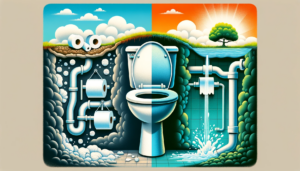Bidet Bliss: A Gentle Clean for Your Body & the Planet
In the quest for eco-friendly living, the bathroom is often overlooked. However, this humble space holds immense potential for environmental stewardship, particularly through the adoption of bidets. The bidet, a time-honored invention, is not just a fixture in bathrooms but a symbol of sustainable practices in personal hygiene.
In Australia, where the awareness of ecological impacts is growing, integrating a bidet toilet seat into daily life goes beyond the realm of personal cleanliness. It is a conscious step towards reducing our ecological footprint. The traditional use of toilet paper, while seemingly innocuous, has far-reaching environmental implications. The production of toilet paper, particularly in North America, is a resource-intensive process. It not only contributes to the felling of countless trees but also necessitates the use of 37 gallons of water per roll, a startling figure when considering the scale of global toilet paper usage.
Moreover, toilet paper production isn’t solely dependent on water; it also relies heavily on virgin pulp, which means more trees are cut down, further exacerbating deforestation. This is where the bidet provides an eco-friendly alternative. Using a bidet toilet seat significantly reduces the need for toilet paper, thereby cutting down on the demand for virgin pulp and the environmental degradation associated with its production.
 Furthermore, the bidet’s efficiency extends to its water usage. Contrary to the misconception that bidets might waste water, they actually use just an eighth of a gallon per wash. This is considerably less than the amount of water expended in the production and disposal of toilet paper. By choosing bidets, households can drastically reduce their water consumption, aligning with the principles of sustainable living.
Furthermore, the bidet’s efficiency extends to its water usage. Contrary to the misconception that bidets might waste water, they actually use just an eighth of a gallon per wash. This is considerably less than the amount of water expended in the production and disposal of toilet paper. By choosing bidets, households can drastically reduce their water consumption, aligning with the principles of sustainable living.
In addition, bidets offer an effective solution to the environmental problems posed by wet wipes. Often marketed as a hygienic alternative to toilet paper, wet wipes have a significant environmental impact due to their non-biodegradable nature. They contribute to sewer blockages and pose a threat to marine life. The bidet eliminates the need for these harmful products by providing a cleaner, water-based solution for personal hygiene.
Adopting a bidet is more than a lifestyle choice; it’s a commitment to preserving our natural resources. It aligns with the principles advocated by organizations like the Natural Resource Defense Council, emphasizing the importance of making sustainable choices in our everyday lives.
How Bidets Save Trees, Water, & Your Wallet
Traditional bathroom habits, especially the use of toilet paper, have a hidden cost – environmental degradation.
- Reduced Tree Consumption: Traditional toilet paper production heavily relies on cutting down trees. In North America alone, millions of trees are felled each year to meet the demand. Switching to a bidet toilet seat drastically cuts down this reliance, helping to preserve forests and the biodiversity they support.
- Water Conservation: It’s startling to learn that a single roll of toilet paper requires about 37 gallons of water to produce. A bidet, on the other hand, uses significantly less water, contributing to much-needed water conservation efforts, particularly in drought-prone areas.
- Minimizing Carbon Footprint: The manufacturing and transportation of toilet paper contribute to carbon emissions. By reducing the need for toilet paper, bidets help in lowering these emissions, making them an eco-friendlier alternative.

- Cost Savings: Over time, the use of a bidet can lead to substantial savings for households. The initial investment in a bidet toilet seat is quickly offset by the reduced need to purchase rolls of toilet paper regularly.
- Reducing Chemical Usage: The production of toilet paper involves bleach and other chemicals. These chemicals can be harmful to the environment when they enter water systems. Bidets eliminate this issue, offering a chemical-free solution to personal hygiene.
- Sustainable Alternative to Recycled Toilet Paper: While recycled toilet paper is a better option than regular toilet tissue, it still requires energy and water for processing. Bidets offer a more sustainable and efficient alternative.
- Supporting Public Health: By reducing the need for toilet paper, bidets also play a role in promoting public health. They offer a more hygienic and gentle cleaning method, which is beneficial for people with skin sensitivities or medical conditions.
Bidets Revolutionize Hygiene with Sustainability at Heart
- Eliminating Wet Wipe Pollution: Wet wipes, often used as an alternative to toilet paper, have a detrimental environmental impact. They are not biodegradable and contribute to sewer blockages. Bidets provide a more eco-friendly and effective cleaning solution.
- Enhancing Bathroom Hygiene: Bidets offer a superior level of cleanliness compared to toilet paper. They efficiently clean the area with water, which is more effective in removing bacteria and reducing the spread of germs.
- Conserving Natural Resources: The shift to bidets can significantly reduce the consumption of natural resources like water and trees, which are heavily exploited in the production of toilet paper and wet wipes.
- Energy Efficient: Modern bidets come with energy-saving features like automatic power economizers and earth leakage protection, making them an environmentally responsible choice for households.
- Reducing Household Waste: By diminishing the need for toilet paper, households can significantly cut down on their waste production, contributing to a more sustainable lifestyle.
- Promoting Eco-conscious Habits: The use of bidets encourages individuals to adopt more eco-friendly habits in other areas of their lives, fostering a culture of environmental responsibility.
- Innovative Features for Sustainability: Many bidets now include features like heated seats and adjustable water temperature, enhancing comfort without compromising on environmental values.
Unmasking the Environmental Benefits of Bidets
The environmental benefits of bidets extend beyond saving trees and water.
1. Reducing Tree Harvesting for Toilet Paper Production
One of the most significant environmental benefits of bidets is their role in decreasing the need for toilet paper, which directly translates to fewer trees being cut down. The production of toilet paper, particularly in North America, heavily relies on virgin pulp, a product of tree harvesting. By opting for bidets, we contribute to preserving forests, a crucial natural resource.
2. Conserving Water Resources
The production of a single roll of toilet paper requires about 37 gallons of water. Bidets, on the other hand, use only a fraction of this amount for each use. This efficient use of water is crucial in times when water scarcity is becoming a pressing global issue.
3. Lowering Energy Consumption
The manufacturing and transportation of toilet paper involve significant energy expenditure. By reducing the reliance on toilet paper, bidets help in cutting down the energy used in these processes, thereby reducing our overall carbon footprint.
4. Minimizing Chemical Usage
Toilet paper production involves various chemicals for processing and bleaching. These chemicals can be harmful to the environment. Bidets, in contrast, provide a clean wash without the need for such chemicals, making them a more environmentally friendly option.
5. Addressing the Wet Wipe Problem
Wet wipes, often used as an alternative to toilet paper, have a disastrous impact on the environment. They do not decompose easily and are a major contributor to sewer blockages. Bidets eliminate the need for wet wipes, thereby mitigating these environmental issues.
6. Promoting Recycled Toilet Paper Use
For instances where toilet paper is still used, bidets can encourage the use of recycled toilet paper. Since bidets reduce the overall amount of toilet paper needed, it becomes more feasible to choose environmentally friendly toilet paper options.
7. Enhancing Public Health
By promoting cleanliness and hygiene, bidets contribute to public health. This is particularly important in the context of the United States and other regions where the usage of bidets is not widespread. Improved hygiene can lead to reduced transmission of pathogens and overall better health outcomes.
Bid Adieu to Toilet Paper Blues
Incorporating a bidet into daily life is more than a personal hygiene choice; it’s a commitment to environmental stewardship. The bidet, as an alternative to toilet paper, embodies sustainability. With features like heated seats and adjustable water temperature, modern bidets offer comfort and cleanliness without the environmental toll of toilet paper.
As the Natural Resource Defense Council and other environmental organizations emphasize, sustainable choices in our daily lives can have a profound impact on public health and the planet. By choosing a bidet over traditional toilet paper, Australians can take a simple yet effective step towards a greener future. Let’s champion this eco-friendly shift in our bathrooms and contribute to a healthier environment. Join us at Bidet Warehouse and experience the life-changing benefits of bidets.


